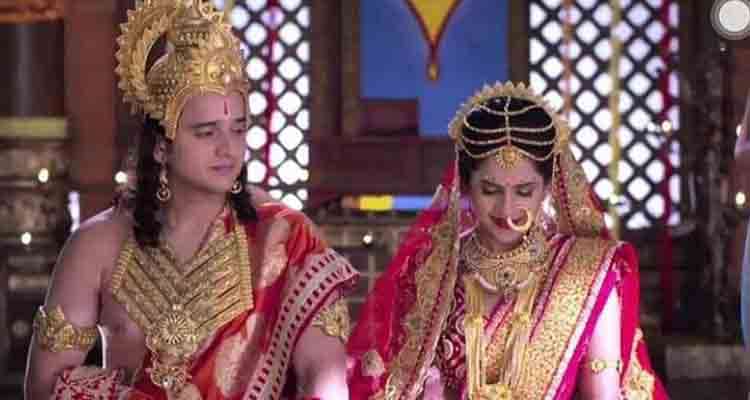Sita, Urmila, Mandavi and Shrutakirti got married together
Rama had strung Shiva’s heavy bow and won Sita. We were all married at the same time to the four brothers. No one cared for how young I was. And Shruta even younger. It was a good home, a prestigious family, all the sisters would remain together, they said. Only, we didn’t. Fate had something else planned for us. And I think Mandavi was singled out to be the one who would have it all but will have nothing.
A mother’s misguided ambition
It all began with Kaikeyi Ma asking for a boon for her son, Bharata. For my husband, Bharata. But she had not foreseen Bharata’s extreme reaction. He had a deep regard for his elder brother and refused to ascend the throne that his mother had contrived to win for him. He placed Rama’s slippers on the throne and ruled as his regent. That was acceptable. But what I was unprepared for was the despondency that completely enshrouded Bharata. He had lost himself in the tangle of his mother’s unfair treatment of Rama, Rama’s stoic acceptance of the same and his own helplessness, shame and guilt. Oh, he was a loving husband. And a good father to Taksh and Pushkal. He did his Kshatriya duty by them, conquered a kingdom for each and established them there. But Ayodhya…he continued to rule in Rama’s name. He’s virtuous, my Bharata. He hardly ever spoke to his mother, though. If he could avoid speaking to Kaikeyi Ma, he would. In contrast, he lavished affection on Kaushalya, who was pining for her Rama. Our Pitamah, Dasharatha, was long gone. When Kaikeyi Ma dies, it will be in emotional isolation, grieving for her unforgiving son.
Bharata is always brooding
Fourteen years is a long time, and Bharata has toted this onerous burden at considerable cost. He doesn’t stop thinking about Rama for a minute. He may as well have gone into exile with him. Lakshman was there, Urmila was asleep here at the palace. When her husband returned, she would wake up to a happy reunion. Shatrughna, also the son of Sumitra carries less guilt. It was not his mother who had sent Rama to the forest, was it? He and Shruta spent many happy hours together. Subahu and Shatrughati are nicely settled in Mathura and Vidisha respectively. Now Shatrughna divides his time between the affairs of the kingdom and his wife.
Bharata, on the other hand, spends too much time brooding over what might have been, over wrongs and injustices. Life quickly passes by. I spend my time looking after the affairs of the palace, with Shruta, of course. Bharata manages Ayodhya, ably aided by Shatrughna. Ours a nicely balanced union, on the face of it. But at the end of the day, I return to a lonely chamber. There was a time when Mandavi used to be the centre of his universe now he doesn’t even acknowledge her existence. He is so preoccupied with his thoughts that I might be sitting right in front of him but he would behave he is alone in the room. There is very little written about Mandavi’s life in Ramayana but if Valmiki had devoted some time to me then he could have written more about my story.
I pay the price for Bharata’s virtue
Such are the wages of being wedded to virtue; a virtue that consumes your life and allows no balance. Or is it the guilt that has consumed him? Vicarious guilt that a man not crippled by societal expectation would manage better! It’s insidious, this guilt. It slips into the brain, then it becomes a habit. It colours relations with everyone. Worse, one may wear it as a badge; it has popular approval. One may solemnly sit on a low chair beside the throne and gather credentials from a fawning populace. You are noble and virtuous because you refuse to be happy, you refuse to forgive, you refuse to forget. Before you know it, your thoughts are a permanent hue of blue-grey. No one sees that. Or pays a price for it. Only the wife does.


